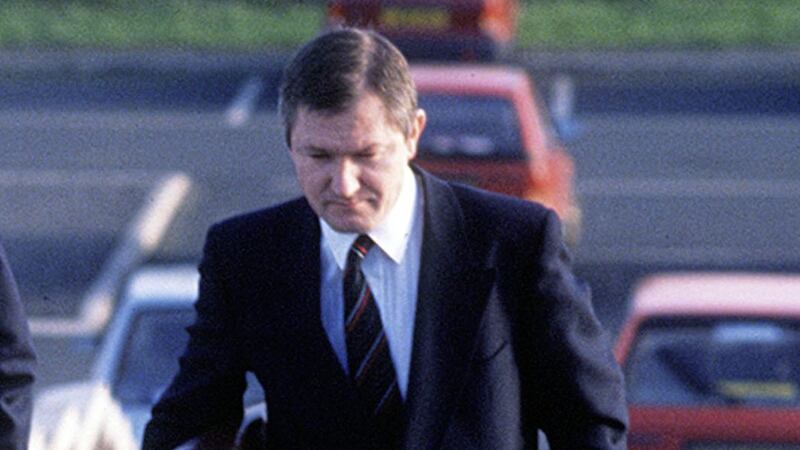When the Supreme Court ruled last year there had not been a human rights-compliant investigation into the murder of Pat Finucane, it added this did not mean there had to be a full public inquiry: “it is for the state to decide what form of investigation, if any, is now feasible”.
So secretary of state Brandon Lewis, in announcing there would be no inquiry, could have offered a wide range of possible alternatives - or none.
What he chose to do was to pass the buck to the PSNI and the Police Ombudsman, who last looked at the case in 2016. They have no new leads, no resources to look for leads and plainly had no idea what Lewis was talking about.
It appears that to spare its blushes, the government casually dragged the PSNI and the complaints body for the PSNI into continuing controversy over one of the worst scandals of the Troubles.
The recklessness of this is extraordinary.
**
As Stormont prepares to roll out a vaccine, the well-known phenomenon of ‘vaccine nationalism’ lurks to the east and south.
Downing Street wanted the Oxford vaccine branded with the Union flag and has dubiously claimed Brexit allowed the UK to approve the Pfizer vaccine early.
There is more than one way to slap a flag on vaccine. Fianna Fáil TD Jim O’Callaghan has proposed the EU provide Pfizer and Moderna vaccines - which it has more on order than it needs - to Northern Ireland, because “there are concerns” about approval of the Oxford vaccine and “this was to be the UK’s lead vaccine.”
However, the UK also has plenty of Pfizer and Moderna vaccines on order. The implied scenario of Northern Ireland going unvaccinated was never going to arise.
O’Callaghan is considered the main challenger to Micheál Martin for the Fianna Fáil leadership and is outspoken on wanting coalition with Sinn Féin.
On vaccine nationalism at any rate, he has made Sinn Féin look like the Alliance Party.
**
All eight DUP MPs voted against the government’s Covid tiers for England, despite the DUP just about agreeing Covid restrictions at Stormont and the convention that only English MPs should vote on English laws.
The unionist votes were not decisive but they could have been had Labour opposed rather than abstained. Fifty Tories defied their party, enough to cost Boris Johnson his majority.
As with Brexit, it seems the DUP thinks its internal tensions can be managed at home by harmlessly releasing them at Westminster. What could possibly go wrong?
**
When the DUP blocked libel reform in 2013, Belfast libel lawyer Paul Tweed was seen as a decisive influence.
Ian Paisley jnr cited him in the Commons while arguing against extending the Defamation Act to Northern Ireland.
Tweed confirmed he had been lobbying all parties on the issue, saying a tougher libel regime here could attract overseas companies seeking to “protect their brand”.
However, Tweed has now told an audience at Queen’s University Belfast he no longer has “any strong objections” to extending the act to Northern Ireland, if only because the internet has rendered it “redundant”.
That would seem to make the DUP’s objection redundant, clearing the way at Stormont for libel reform.
**
The UUP has criticised Sinn Féin finance minister Conor Murphy for not setting up a fiscal advisory council, promised in New Decade, New Approach and standard practice internationally to provide governments with independent economic expertise.
Murphy’s department says it has been busy with Covid and will establish the council shortly. A delightful detail of this debate is that the Republic is unique in the world in having two such bodies: one required under its economic crash recovery deal and another it set up itself. This feels much more like something that should have happened in Northern Ireland. Perhaps we will end up with four or five.
**
Last month, the Department for Infrastructure’s walking and cycling ‘champion’ told Stormont such travel options “have not been a political priority over the last 40 to 50 years”, contradicting every minister for the past nine years.
Now another official has suggested civil service petrol-heads are at the wheel.
Questioned by Belfast City Council about the department’s failure to deliver its own plans, the head of DfI Roads for Belfast said: “Not everybody is on board in terms of providing sustainable infrastructure. So we have to strike a balance between those people who do want sustainable infrastructure, and those who want to keep the commercial traffic moving across the city.”
SDLP minister Nichola Mallon wants sustainable transport and believes that to be in the city’s commercial interests. By what authority can her officials frustrate this on behalf of uncooperative lobbies?
**
Shame on the press offices of Northern Ireland Water and the Department of Agriculture, who organised a media event featuring NI Water director Alistair Jinks planting a tree 1,200 feet up in the Mournes, yet not once used the term ‘High Jinks’. What is the point of recruiting so many journalists as press officers if we cannot have tabloid puns?









